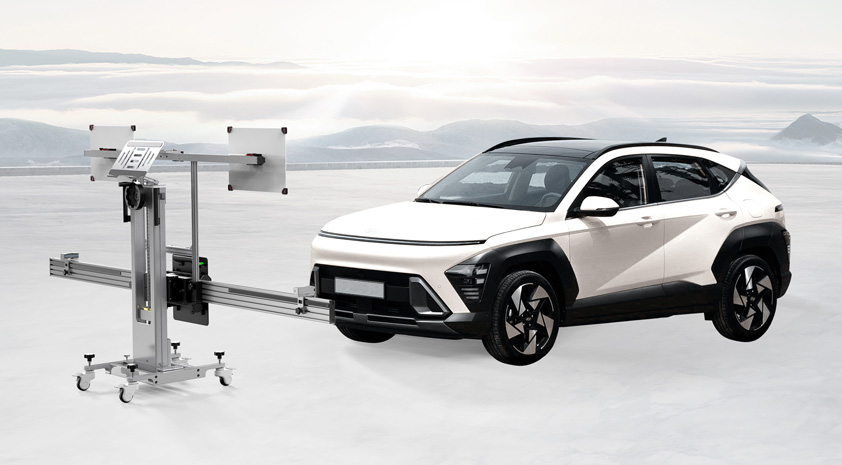Hyundai cars are usually equipped with a variety of ADAS (Advanced Driving Assistance Systems) technologies to improve driving safety and comfort. These technologies may include:
① Adaptive Cruise Control (ACC): Uses radar and cameras to monitor the speed of the vehicle ahead and automatically adjusts the vehicle's speed to maintain a safe distance.
② Forward Collision Warning System (FCWS): Monitors vehicles and obstacles ahead through the front camera and provides warnings to avoid collisions or reduce damage caused by collisions.
③ Automatic emergency braking system (AEB): When a possible collision risk is detected, this system will automatically initiate braking to reduce the severity of a collision or avoid a collision.
④ Lane Keeping Assist System (LKA): Monitors the position of the vehicle through a camera and provides a warning or automatically corrects the direction when the driver intends to deviate from the lane.
⑤ Blind Spot Monitoring System (BSD): Helps drivers monitor blind spot areas around the vehicle and provides warnings to prevent accidents when accidentally changing lanes or merging.
⑥ Rear Cross-Traffic Collision-Avoidance Assist (RCCA) system:Monitors side traffic and provides warnings when reversing to prevent collisions when reversing.
⑦ Highway Driving Assist (HDA) system: By combining navigation and sensor data, it provides driving assistance functions on the highway, including lane center keeping, adaptive cruise control, etc.

During the Hyundai ADAS calibration process, some common problems involve system calibration errors, sensor failures, incomplete calibration, etc. Here are a few common issues and possible solutions:
1. Sensor contamination or obstruction: The sensor may not work properly due to dust, dirt or obstruction. Solutions include regularly cleaning the sensor surface to ensure it is free of obstructions and clear.
2. Calibration error or inaccuracy: If the ADAS calibration is found to be inaccurate, a second calibration or recalibration may be required. It is recommended to seek out a certified technician for accurate calibration procedures to ensure calibration accuracy.
3. System warning or fault prompt: If the ADAS system frequently issues warnings or displays fault messages, it may be a sensor failure or system setting problem. Solutions include checking system settings, checking sensor status and making sure they are working properly.
4. Incomplete or Interrupted Calibration Procedure: If an interruption or incompleteness occurs during the calibration process, it may result in a failed or inaccurate calibration. It is recommended to check the calibration equipment and procedures to ensure that the calibration is carried out in the appropriate environment and to avoid interrupting the calibration process.
5. Software updates and system compatibility: If the ADAS system has compatibility issues or needs to be updated, it is recommended to regularly check and install software updates provided by the manufacturer. Make sure your system is compatible with the latest version of the software and follow the update instructions.
The Hyundai ADAS calibration process is a delicate and critical step that ensures the vehicle's safety systems can accurately recognize road conditions and respond accordingly. Although the exact steps may vary from model to model. For more calibration content, please view the following cases:
1. Hyundai Santafe(DM) Radar Sensor Alignment (SCC/AEB)
2. 2018 Hyundai Tucson(TL) SPTAC Calibration
4. Hyundai Sonata(LF) SVM Calibration
6. Hyundai Elantra(AD) Normal area 2018 G 2.0 MPI BSD Radar Calibration
7. Hyundai AVM Tolerance Compensation
To maintain the optimal performance of your Hyundai ADAS system, here are some recommendations and maintenance guidelines:
Routine maintenance and precautions:
1. Keep the sensors clean: Clean the sensors and cameras in the ADAS system regularly to avoid dust, dirt or water mist from affecting their recognition capabilities.
2. Regularly check the calibration status: Regularly check the calibration status of the ADAS system to ensure that it is inaccurate and reliable working condition.
3. Pay attention to the maintenance cycle: Carry out vehicle maintenance and inspection regularly according to the manufacturer's recommendations, including inspection and maintenance of the ADAS system.
4. Keep software updated: Regularly check for and install ADAS system software updates provided by the manufacturer to ensure the system has the latest features and fixes.
5. Driving attention: Although the ADAS system provides many auxiliary functions, the driver still needs to maintain a high degree of vigilance and concentration to avoid over-reliance on the system.
Recommended calibration frequency and period
1. Calibrate according to manufacturer's recommendations: Calibrate the ADAS system strictly according to the Hyundai manufacturer's recommendations, which is usually done after specific mileage or time intervals.
2. Additional calibration under special circumstances: If the vehicle experiences a collision or other situation that affects the ADAS system, additional calibration should be performed immediately to ensure the accuracy and reliability of the system.
3. Periodic calibration checks: Perform periodic calibration checks, especially during adverse weather conditions or when road conditions change.
4. Calibration after installation of new parts: If any parts related to the ADAS system are replaced, be sure to perform calibration to ensure the compatibility and accuracy of the new parts.
Following the above recommendations and maintenance guidelines can ensure the long-term performance and reliability of your Hyundai ADAS system while improving driving safety and comfort. If there are any uncertainties, it is recommended to consult professional technicians or Hyundai authorized repair service centers in time.
Precise calibration tools are crucial for modern car ADAS calibration. These tools can help professional technicians effectively calibrate the various ADAS sensors and systems in Hyundai cars to ensure that they can accurately recognize and respond to various situations on the road. We recommend several ADAS calibration tools from SmartSafe:
① ADAS PRO+ ADAS Calibration Tool
② ADAS MOBILE ADAS Calibration Tool
③ ADAS LITE ADAS Calibration Tool
④ ADAS RADAR 3IN1 Passenger Vehicle ADAS Radar Calibration Toolkit
The above tools are easy to operate, cover 95% of the world's car models, and can accurately calibrate different ADAS systems. They are a good helper for the automotive ADAS calibration center!
Return